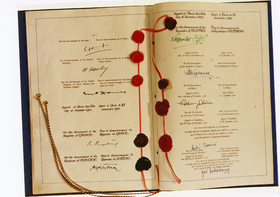

Inspired by the UN Declaration on Human Rights, the Council of Europe established the European Convention on Human Rights and Fundamental Freedoms. A Court of Human Rights was established in Strasbourg to adjudicate on human rights violations. The Convention was signed in Rome in 1950 and took effect from 1953. Citizens of states which have signed up to the Convention may bring cases against their own governments, alleging breaches of human rights under the Convention. All the EU members and applicant countries are signatories to the European Human Rights Convention, but the EU institutions are not yet bound by it. The EU as a whole has not signed it.
A special convention has written an EU-Charter with common human rights. This Charter is now proposed in part II as a binding element of the EU Constitution.
Britain and the ECHR
The Convention was incorporated into all forms of UK law through the Human Rights Act of 1998 and Acts setting up the Scottish Parliament, the Welsh and Northern Ireland Assemblies.
The future
The EU Constitution provides a legal base for the EU to subscribe to the Human Rights Convention. The EU will gain a legal personality allowing it to do so. This will not affect the competence of the Union, as mentioned in Article 5.
The constitution wording does not give primacy to the Human Rights Convention as proposed by Euro-critics in the Charter Convention. If a conflict arises between the Human Rights Court in Strasbourg and the EU Court in Luxembourg, the judgement of the EU Court will hold sway according to the draft Constitution.
Links
See also EU Court.